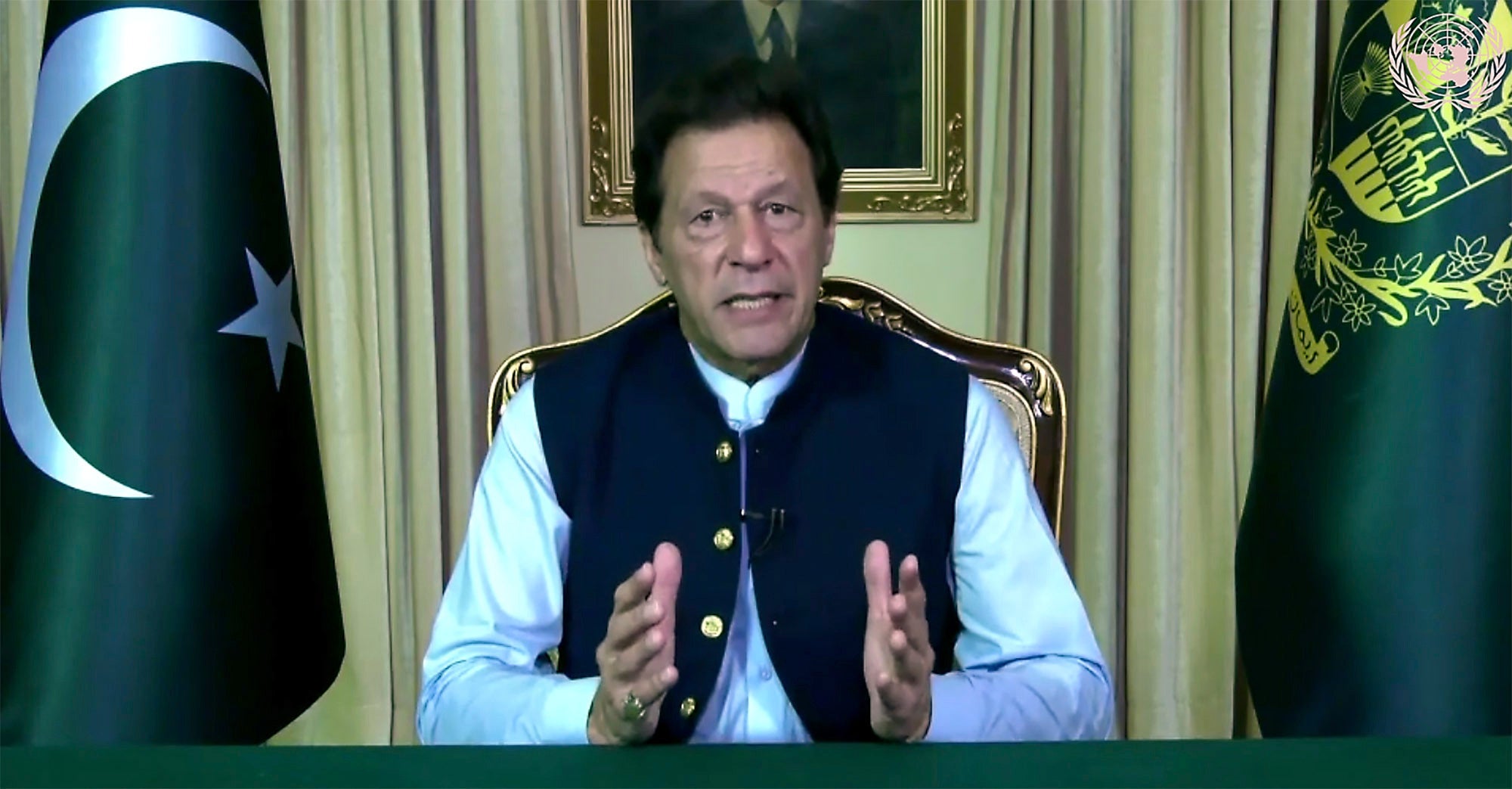At UN, Pakistani leader calls India a sponsor of Muslim hate
Pakistani Prime Minister Imran Khan has assailed India’s Hindu nationalist government and its moves to cement control of Muslim-majority Kashmir, calling India a state sponsor of hatred and prejudice against Islam

Your support helps us to tell the story
From reproductive rights to climate change to Big Tech, The Independent is on the ground when the story is developing. Whether it's investigating the financials of Elon Musk's pro-Trump PAC or producing our latest documentary, 'The A Word', which shines a light on the American women fighting for reproductive rights, we know how important it is to parse out the facts from the messaging.
At such a critical moment in US history, we need reporters on the ground. Your donation allows us to keep sending journalists to speak to both sides of the story.
The Independent is trusted by Americans across the entire political spectrum. And unlike many other quality news outlets, we choose not to lock Americans out of our reporting and analysis with paywalls. We believe quality journalism should be available to everyone, paid for by those who can afford it.
Your support makes all the difference.Pakistani Prime Minister Imran Khan on Friday assailed India’s Hindu nationalist government and its moves to cement control of Muslim-majority Kashmir calling India a state sponsor of hatred and prejudice against Islam.
Khan said at the annual U.N. gathering of world leaders that Islamophobia rules India and threatens the nearly 200 million Muslims who live there.
“They believe that India is exclusive to Hindus and others are not equal citizens,” he said in a prerecorded speech to the U.N. General Assembly, which is being held virtually amid the coronavirus pandemic.
Khan has frequently and fervently criticized the August 2019 decision by the government of Prime Minister Narendra Modi to strip Jammu and Kashmir’s statehood, scrap its separate constitution and remove inherited protections on land and jobs.
India’s action and a harsh security clampdown that followed has sparked protests. U.N.-appointed independent experts have called on India to take urgent action to address the alarming human rights situation in the territory.
Residents of the heavily militarized Indian-controlled region of Kashmir say security forces have arrested thousands of young men, raided people's homes, inflicted beatings and electric shocks, and threatened to take away and marry their female relatives. Thousands of protesters over the past year have been wounded by shotgun pellets, including hundreds blinded in one or both eyes. For seven months, until March, the area was under a communications blackout with social media and internet access banned.
“The international community must investigate these grave violations and prosecute the Indian civil and military personnel involved in state terrorism and serious crimes against humanity,” Khan said.
The larger Kashmir region is split between India and Pakistan. The nuclear-armed neighbors have fought two wars over the territory. India accuses Pakistan of arming and training insurgents fighting for Kashmir’s independence from India. Pakistan denies the charge and says it offers only diplomatic and moral support to the rebels.
Khan, as he did in his speech before the world body last year, also condemned the targeting of Muslims in many countries. He noted provocations and incitement, such as the Quran being burned or offensive depictions of the Prophet Muhammad, that took place “in the name of free speech.”
Despite Khan's outcry at the treatment of Muslims worldwide, Pakistan has not criticized China’s assault on its Muslim minority Uighur population. China has been accused of incarcerating tens of thousands of Uighurs in so-called reeducation camps aimed at indoctrinating them in China’s communist ideology and away from their Islamic beliefs.
Pakistan’s silence, like that of other influential Muslim nations, is linked to its economic ties to China. Pakistan is heavily indebted to China, and the two countries have a long history of military cooperation. China has provided Pakistan with missiles capable of carrying nuclear warheads.
Khan also used his speech to call for debt relief for poor nations amid the pandemic.
He said COVID-19 illustrated that “no one is safe unless everyone is safe.” He said lockdown measures by richer countries have triggered a global recession that has hit poor countries the hardest. He touted his government's decision not to impose a wide-scale lockdown, which he said would have led to more people dying of hunger than the virus.
“However, we are still not out of the woods, like no country is out of the woods today,” Khan said.
Pakistan, with a population of about 220 million, has recorded 6,444 COVID-19 deaths from around 309,000 infections since February.
Khan said a push by the Group of 20 leading rich and developing countries to suspend debt repayment of poorer nations and rapid finance efforts by the International Monetary Fund are not enough. He called for the creation of at least $500 billion in new special drawing rights for developing nations.
___
Batrawy reported from Dubai, United Arab Emirates.